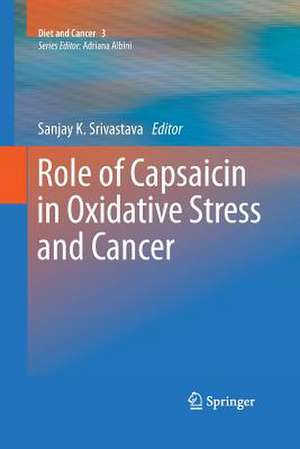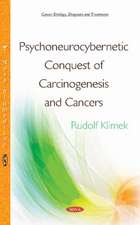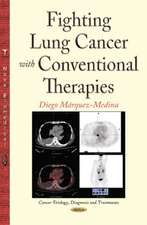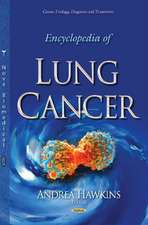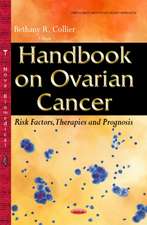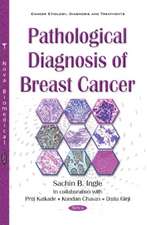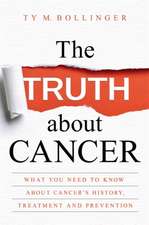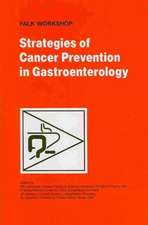Role of Capsaicin in Oxidative Stress and Cancer: Diet and Cancer, cartea 3
Editat de Sanjay K. Srivastavaen Limba Engleză Paperback – 19 mai 2015
| Toate formatele și edițiile | Preț | Express |
|---|---|---|
| Paperback (1) | 709.87 lei 6-8 săpt. | |
| SPRINGER NETHERLANDS – 19 mai 2015 | 709.87 lei 6-8 săpt. | |
| Hardback (1) | 716.28 lei 6-8 săpt. | |
| SPRINGER NETHERLANDS – 7 mai 2013 | 716.28 lei 6-8 săpt. |
Preț: 709.87 lei
Preț vechi: 747.23 lei
-5% Nou
Puncte Express: 1065
Preț estimativ în valută:
135.85€ • 140.75$ • 113.38£
135.85€ • 140.75$ • 113.38£
Carte tipărită la comandă
Livrare economică 22 martie-05 aprilie
Preluare comenzi: 021 569.72.76
Specificații
ISBN-13: 9789401784290
ISBN-10: 9401784299
Pagini: 190
Ilustrații: IX, 178 p.
Dimensiuni: 155 x 235 x 10 mm
Greutate: 0.27 kg
Ediția:2013
Editura: SPRINGER NETHERLANDS
Colecția Springer
Seria Diet and Cancer
Locul publicării:Dordrecht, Netherlands
ISBN-10: 9401784299
Pagini: 190
Ilustrații: IX, 178 p.
Dimensiuni: 155 x 235 x 10 mm
Greutate: 0.27 kg
Ediția:2013
Editura: SPRINGER NETHERLANDS
Colecția Springer
Seria Diet and Cancer
Locul publicării:Dordrecht, Netherlands
Cuprins
Preface.- Role of capsaicin in cancer prevention.- Role of death receptors belonging to the TNF family in capsaicin-induced apoptosis of tumor cells.- Role of capsaicin in prostate cancer.- Capsaicin and the urinary bladder.- Inhibition of pancreatitis and carcinogenesis by capsaicin.- Cytochrome P450-dependent modification of capsaicinoids: pharmacological inactivation and bioactivation mechanisms.- The cancer suppressing and promoting actions of capsaicin.- Oxidative stress by capsaicin in cancer.
Textul de pe ultima copertă
Capsaicin is a principal pungent ingredient of red chili peppers, first isolated in the early nineteenth century by Christian Friedrich Bucholz. Widely consumed as a spice in South Asia and Latin America, Capsaicin has been used to treat pain and inflammation associated with a variety of diseases, including rheumatoid arthritis, diabetic neuropathy, post-masectomy pain, cluster headaches, and herpes zoster. Although recent studies have evaluated capsaicin as a novel anti-cancer agent, and mechanisms of capsaicin in preventing cancer have been described sporadically, the literature lacks a comprehensive review of capsaicin as a chemo-preventive agent.
Role of Capsaicin in Oxidative Stress and Cancer offers a thorough exploration of the preventive and therapeutic effects of capsaicin in cancer models such as melanoma, pancreatic cancer, colon cancer, gastric cancer, breast cancer, prostate cancer, skin cancer, lung cancer, multiple myeloma and glioma.
The contributors, all internationally recognized researchers, identify various molecular and cellular targets of capsaicin, and show the critical role of mitochondria in capsaicin-mediated therapeutic effects. Readers will learn how capsaicin prevents or may treat cancer, how different cells respond to capsaicin, how environmental carcinogen-induced carcinogenesis can be prevented by capsaicin and the mechanism of oxidative stress caused by capsaicin. This book will benefit medical students, oncologists and cancer researchers everywhere.
Role of Capsaicin in Oxidative Stress and Cancer offers a thorough exploration of the preventive and therapeutic effects of capsaicin in cancer models such as melanoma, pancreatic cancer, colon cancer, gastric cancer, breast cancer, prostate cancer, skin cancer, lung cancer, multiple myeloma and glioma.
The contributors, all internationally recognized researchers, identify various molecular and cellular targets of capsaicin, and show the critical role of mitochondria in capsaicin-mediated therapeutic effects. Readers will learn how capsaicin prevents or may treat cancer, how different cells respond to capsaicin, how environmental carcinogen-induced carcinogenesis can be prevented by capsaicin and the mechanism of oxidative stress caused by capsaicin. This book will benefit medical students, oncologists and cancer researchers everywhere.
Caracteristici
Thoroughly reviews the preventive and therapeutic effects of capsaicin in melanoma, pancreatic cancer, colon cancer, breast cancer, lung cancer, multiple myeloma and others Identifies molecular and cellular targets of capsaicin and describes the role of mitochondria in capsaicin-mediated therapeutic effects Benefits medical students, oncologists and cancer researchers
